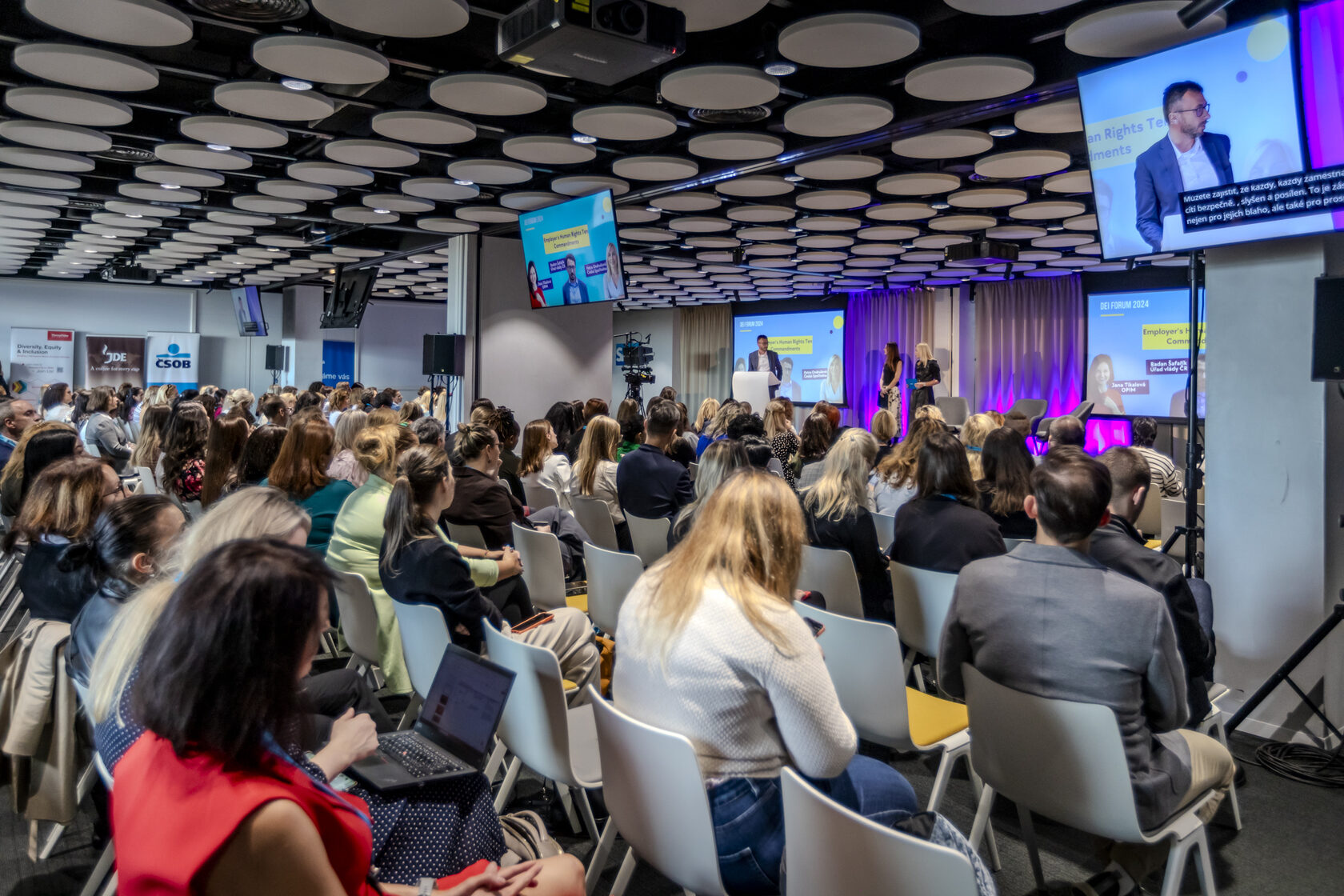At the DEI Forum 2024: Resilience and Persistence, leaders, HR professionals and advocates gathered to explore how resilience and persistence can be powerful tools in advancing diversity, equity, and inclusion (DEI) in the workplace. The forum emphasized the importance of staying committed to DEI efforts, even in the face of challenges like employee resistance, systemic barriers, and the evolving expectations of younger generations. This article reflects on the critical moments and insights from the first part of the event.
Employer's Human Rights 10 Commandments
The DEI Forum 2024 marked a significant step forward in advancing human rights within the workplace with the introduction of the "Employer's Human Rights 10 Commandments".
"This groundbreaking initiative aims to educate employers on their fundamental human rights obligations, empowering them to make meaningful changes within their organizations and, importantly, in regions outside the capital", said Jana Tikalová (CEO of OPIM).
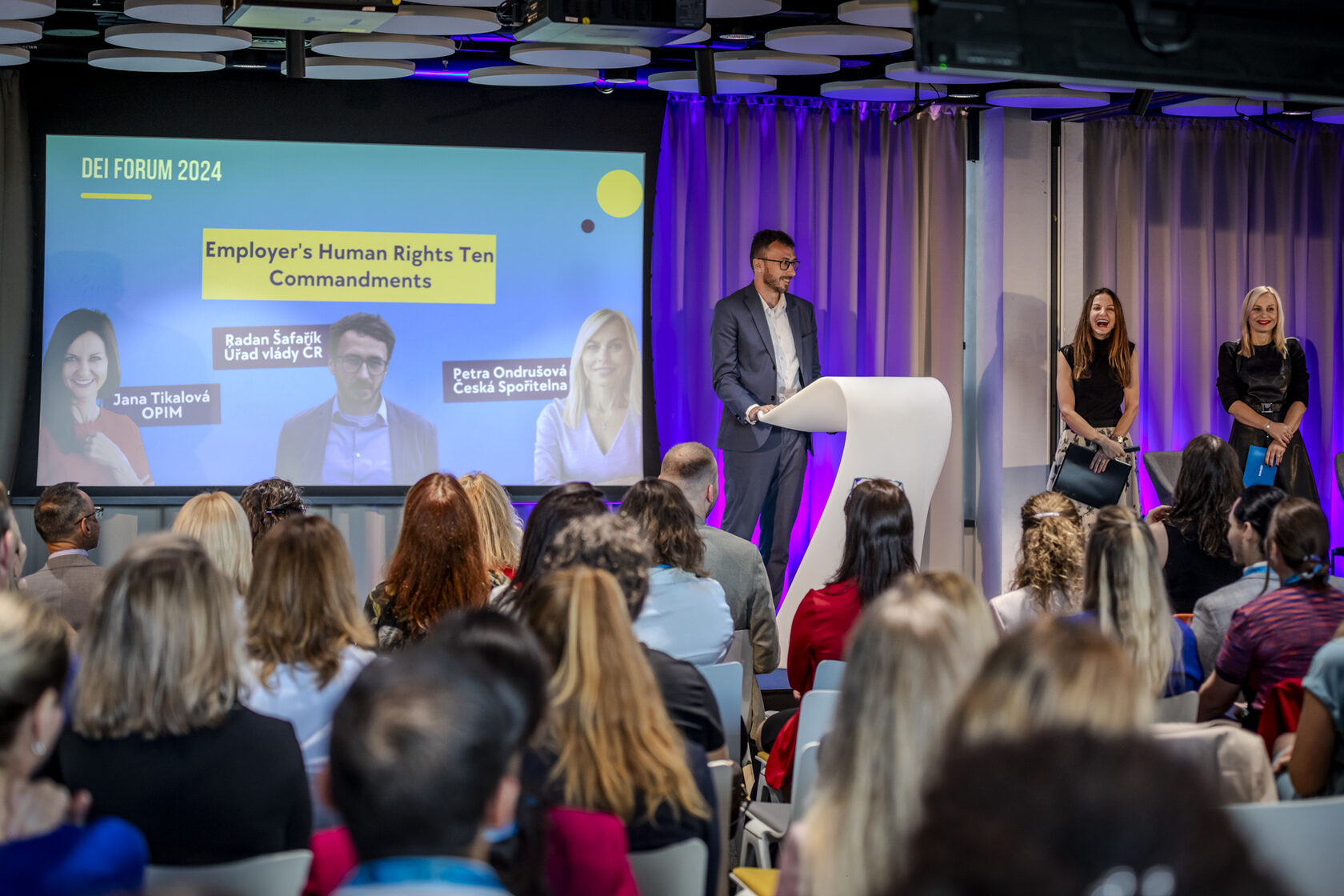
One of the keynote speakers, Radan Šafařík (Office of the Government of the CR), underscored the relevance of human rights in the workplace and emphasized the direct link between workplace well-being and broader societal impact:
“Human rights are not just abstract legal concepts; they are a reality for each of us every day. Employers play a crucial role in the practical implementation of human rights, as people spend a significant part of their lives at work. This is vital not only for their well-being but also for the prosperity of the organization and our society as a whole.”
Another keynote speaker, Petra Ondrušová, delivered a powerful talk titled Mission Possible? Resilience and Persistence in DEI. She emphasized that for the DEI mission to succeed, it is essential to influence life through these principles at every possible level—whether it's the state, company, region, team, or family. Her message served as a reminder that meaningful change begins with individual commitment, and from there, it can ripple out to impact the broader society:
"There is one level that absolutely everyone can reach: we can each start with ourselves."
Overcoming DEI Challenges: Anna's Journey
Sarah Cordivano (StartSteps) introduced a fictionalized character, Anna, to illustrate the common challenges DEI professionals face. Anna’s journey began with enthusiasm as she took on the responsibility for diversity, equity, and inclusion at her financial services company. However, she quickly faced overwhelming obstacles: limited resources, leadership indifference, and constant pushback, leading her to the brink of burnout.
Sarah's advice for tackling challenges in DEI roles includes clearly defining leadership responsibilities to secure their support, creating a structured strategy that aligns with organizational goals, and reflecting on personal motivation and well-being to maintain resilience amidst difficulties.
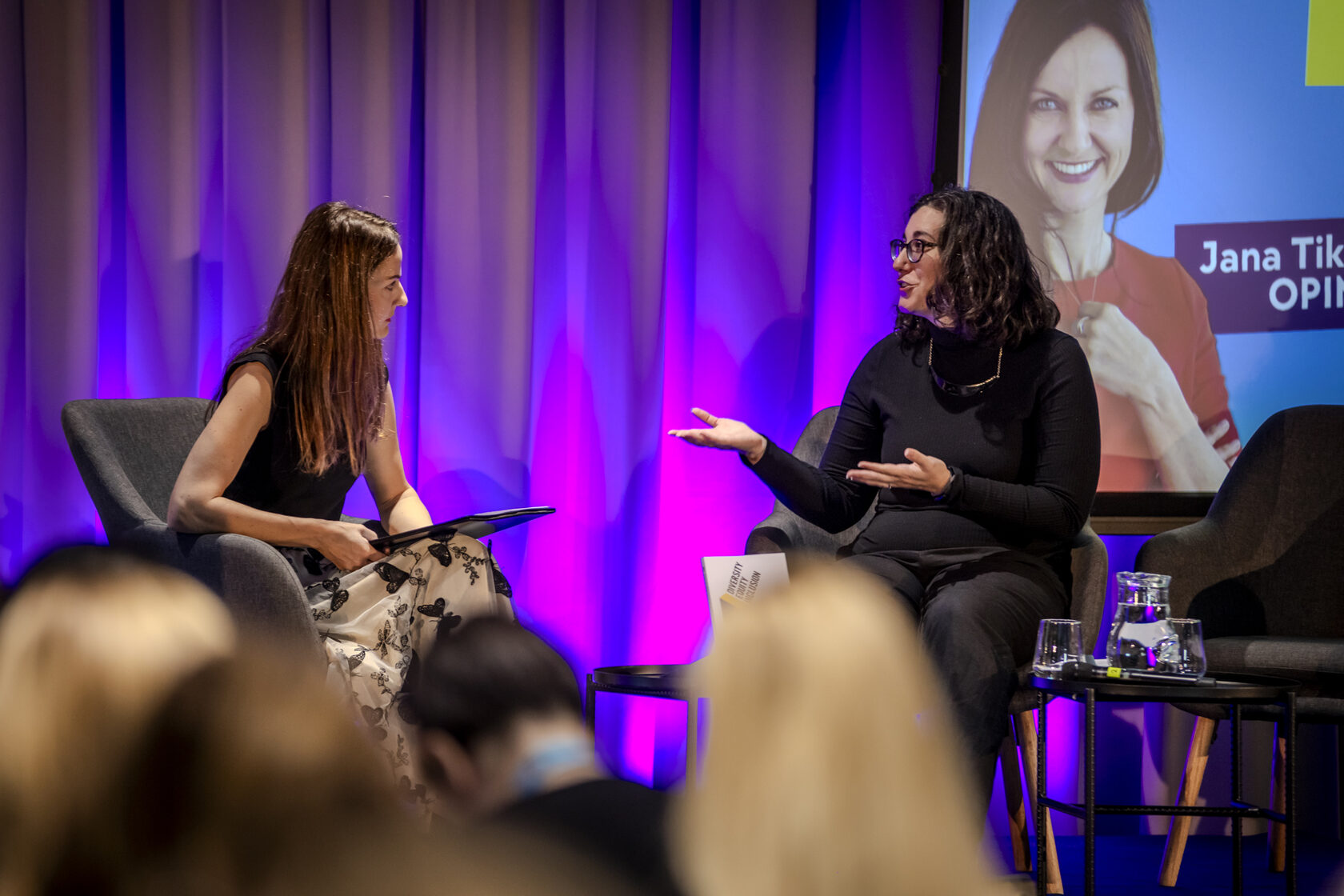
Sarah's main point revolves around the importance of having a strong support network while working in the often challenging field of Diversity, Equity, and Inclusion (DEI). Here’s a practical summary of her advice:
- Build a Support Network: Surround yourself with people who understand the challenges of DEI work and can keep you motivated. This network can provide encouragement and perspective when the work gets tough.
- Maintain a Healthy Work-Life Relationship: Acknowledge that a job is ultimately a financial transaction. It’s essential to balance your passion for DEI with the reality of job dynamics to prevent burnout.
- Understand Stakeholders: When facing pushback, engage with your colleagues to understand their concerns and motivations. This means being a good communicator and tailoring your DEI messaging to resonate with their interests, whether they’re focused on budgets, hiring, or other operational aspects.
- Develop a Strategic Plan: Establish a clear DEI strategy. This involves researching existing challenges, identifying key stakeholders, and setting a vision for where you want to be in the future. By creating milestones and initiatives, you can track progress, maintain motivation, and show tangible results.
- Collaborate for Success: Involve the right people in the strategy-making process. Ensure those critical to DEI’s success have input and buy-in, which will make it easier to secure the necessary resources and support.
- Leverage Resources: Utilize available resources, such as blogs or books, to guide your strategy development without incurring costs.
The Role of Male Allyship in Advancing Women To Senior Positions
In the panel discussion moderated by Martin Janáček (SAP), Violeta Luca (Vodafone) and Munir Nandi (Citi) — both influential CEOs— focused on the crucial role male allies play in advancing gender equality. Violeta's perspective on equality and opportunity is that you have to work with the cards you're dealt. She well put it in words:
"Life gives you currency and it's up to you how you spend it."
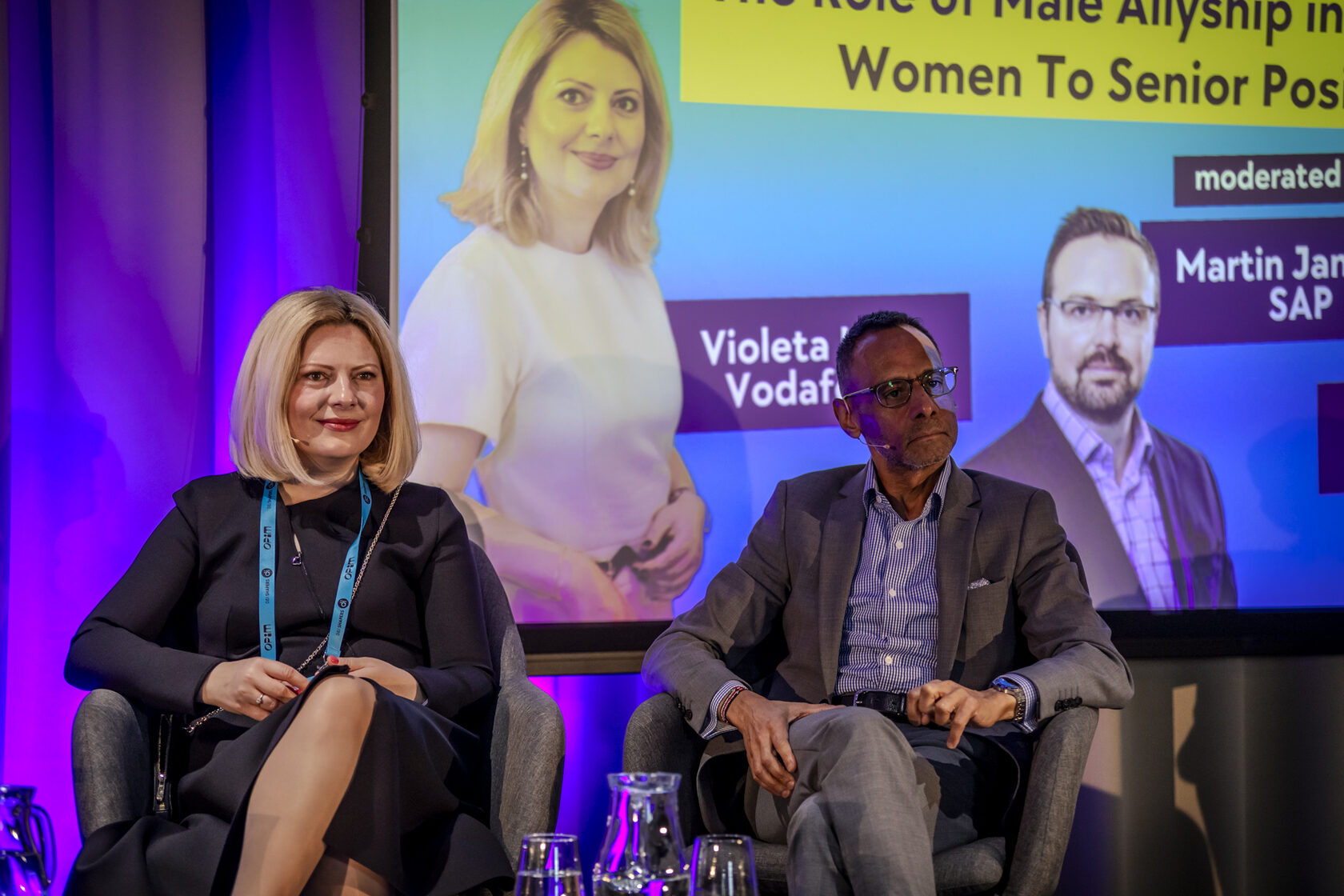
Here are three key messages from the panel discussion:
- Male Allyship is Crucial for Gender Equality: The panel emphasized that men need to be part of the conversation on gender equality. It's not just about women advocating for themselves; men should actively listen, understand women's challenges, and take responsibility as allies to help create change in the workplace.
- Bystander Intervention and Responsibility: Men often witness inequality or harassment but remain bystanders. The discussion stressed that men need to speak up and take action when they see something wrong, as silence perpetuates the issue.
- Fear of Power Loss and Positive Bias Concerns: The panel addressed the resistance to promoting diversity, often rooted in a fear of losing power or influence. Additionally, they cautioned against creating a "positive bias," where diversity initiatives might be perceived as favoring women solely based on gender rather than merit.
Munir's advice focuses on these key actions:
The call to action for the audience is to practice allyship every day by committing to one specific action that includes men in discussions about gender equality. Whether it’s encouraging a male colleague to join a conversation, supporting women’s contributions, or challenging any unfair behavior,
- Use the Wisdom of Crowds and Soft Nudges: When encountering resistance to diversity, especially from high-performing leaders who are negative about DEI, it's helpful to create an environment where diverse perspectives are shared. Having others in the room who support diversity can help open the eyes of resistant individuals through collective conversation. Soft nudges, such as publicly praising women's contributions in meetings or emails, can subtly shift attitudes without confrontation.
- Be Good Listeners: He encourages everyone, especially male allies, to listen with intention. Understand why someone, particularly women, is communicating in a certain way and what they may be going through. Active listening helps foster empathy and awareness.
- Speak Up When You See Injustice: Munir advises to speak out when witnessing unfairness, such as someone not being promoted, harassed, or not given a voice in meetings. Even if it feels uncomfortable, addressing these issues directly and respectfully can create positive change and shift the culture.
The call to action for the audience is to practice allyship every day by committing to one specific action that includes men in discussions about gender equality. Whether it’s encouraging a male colleague to join a conversation, supporting women’s contributions, or challenging any unfair behavior,
Simplifying DEI for Everyone
During the panel discussion moderated by Petr Skondrojanis (Cocuma) titled Building Resilience and Working with Employees' Resistance to Diversity and Inclusion, Dinah Richter Spritzer (Media Confident) stressed that DEI is not just a niche concern but a universal issue that impacts all employees. She emphasized the need for clear, jargon-free communication to make DEI accessible and relatable to everyone in the organization. Her perspective highlighted the power of simplicity in achieving broader engagement with DEI initiatives.
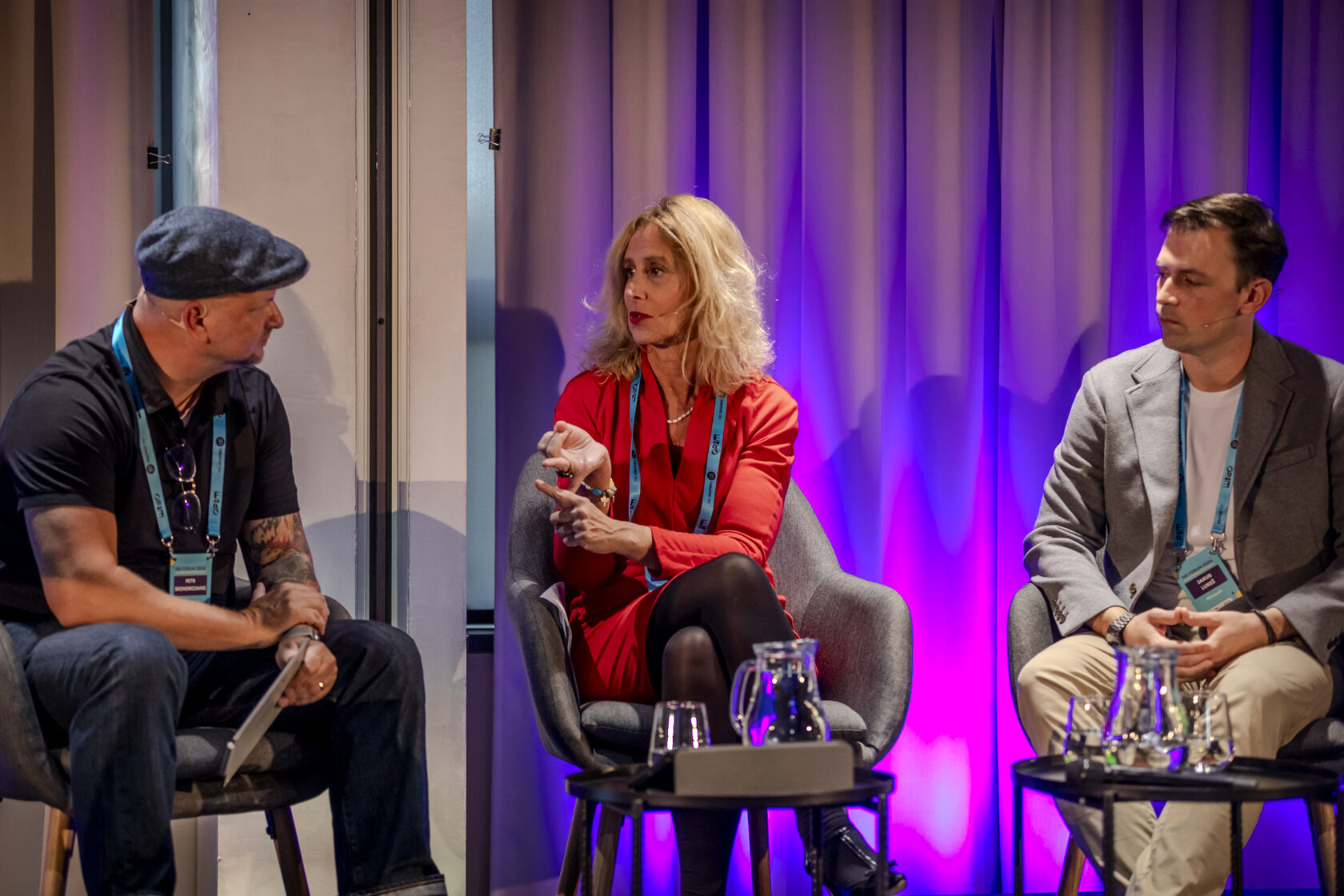
Jakub Lukeš (Microsoft) presented a compelling case for inclusion as a driver of innovation. He shared the story of an engineer who, inspired by his child’s disability, developed the Xbox adaptive controller. This creation not only made gaming more accessible but also generated new revenue streams for Microsoft, demonstrating the business potential of addressing diversity and inclusion.
To be continued...
Thank you for joining us on this insightful journey through the DEI Forum's morning sessions! From the launch of the Employers Human Rights 10 Commandments to the powerful stories shared by DEI leaders, these sessions highlighted the real-world impact of diversity, equity, and inclusion. The discussions underscored the importance of male allyship, resilience in the face of DEI challenges, and how inclusion drives innovation. Stay tuned for our next blog, where we’ll dive into the afternoon discussions, including inspiring lightning talks and thought-provoking panels that pushed the boundaries of DEI thinking even further. There's much more to uncover!
